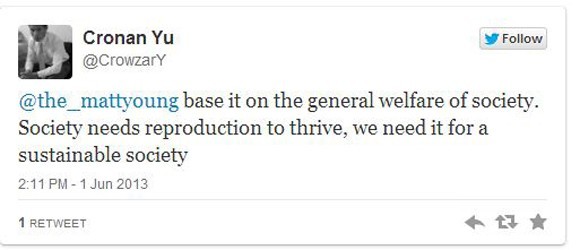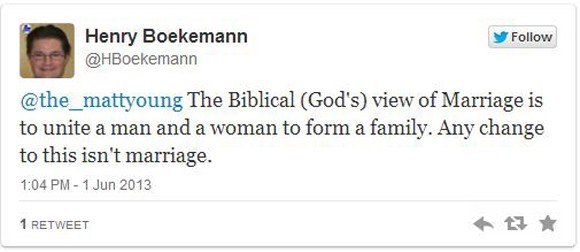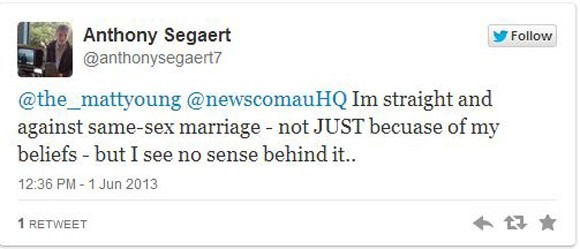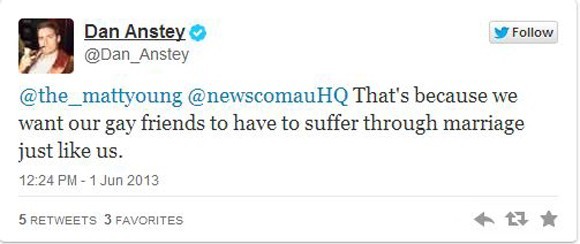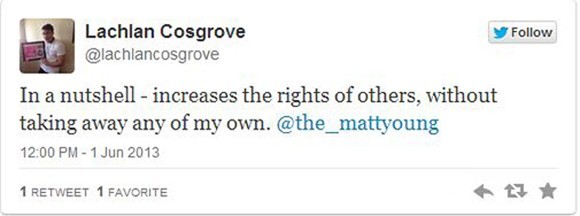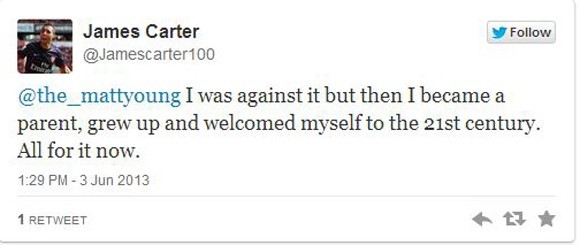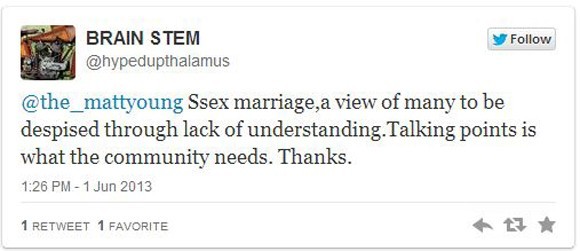STRAIGHT Aussie blokes have come forward to air their views on same-sex marriage in an attempt to open the topic for discussion.
Latest statistics from Galaxy research shows 42 per cent of Australian men believe same-sex couples should not be allowed to marry, in comparison to 30 per cent of women.
Why? News.com.au asked six guys – three FOR, three AGAINST – exactly that.
Here are the results.
AGAINST
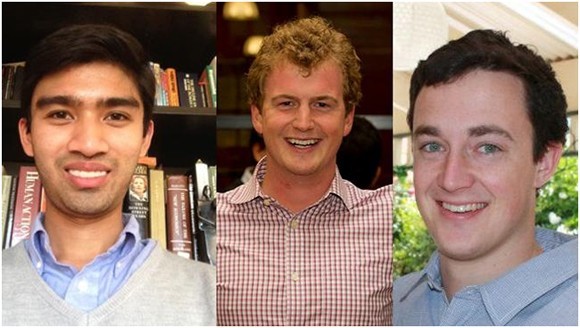
AGAINST: (L-R) Chaneg Torres, Patrick Langrell & David Buster. Source: Supplied
Chaneg Torres | 19, Politics Student
Marriage by definition is between a man and a woman.
It recognises the unique biological reality of sexual union between a man and a woman; a union that produces children.
Its institutional importance is in solidifying the responsibility and bonds between biological parents and children through societal norms and legal obligations.
It also presents as an ideal the right of a child to a mother and a father.
A homosexual union, no matter how much the two people may love each other, can never produce children together through becoming one in sexual union.
Thus marriage is by definition a heterosexual construct with biological foundations.
So while heterosexual infertile couples have still had their relationships recognised as marriages, it is the principle of biological union that underpins marriage.
As a society, we have already recognised the huge importance of children being connected to their biological parents.
In our apology to the Stolen Generations, whether foster homes were loving or not, we recognised that to deny children the connection to their biological parents was detrimental.
Once marriage ceases to be grounded in the biological reality of the male and female union, it becomes nothing more than an institution centred around emotional attachment with the added inconvenience of having to file for divorce.
The expression of love within a monogamous relationship is not what makes marriage unique and if it were merely about love, then it would be ridiculous for the state to recognise it.
Patrick Langrell | 25, Chaplaincy Convenor, The University of Notre Dame Australia
The curious thing about marriage is that it’s had a fairly basic shape throughout history.
Why? Because marriage addresses three persistent truths.
First, the majority of us are powerfully attracted to an act of love that makes new life. Sex between men and women makes babies.
Secondly, whilst we can all make up our minds individually about reproducing, a society can’t. And it’s only those that have figured out how to manage the procreative implications of male-female sexual relationships that have survived. Society needs babies.
Thirdly, children ought to have a father as well as a mother. Being a dad and being a mum are just different, complementary and unique ways of knowing and loving kids.
Marriage therefore exists to unite a man and a woman together as husband and wife, to be father and mother to any children that their union brings forth.
Not all end up having children, but every child born has a mum and a dad.
There’s nothing homophobic, anti-gay or even religious about this.
That’s why what’s become known as the debate over “gay marriage” is not directly about homosexuality, it’s about marriage.
It’s not about whom to “let marry”, but what marriage is.
David Buster | 21, Accountant
In Australia we enjoy the freedom to express our opinions and to practice the religious beliefs of our choosing.
My concern with legalising gay marriage is that it may be used to impinge on these freedoms.
For many people, their notion of marriage is intertwined with their core beliefs.
So what happens to those individuals when a country’s laws are in direct opposition to personally held beliefs?
Some examples: A charity opposing gay marriage in NZ has recently received notification that it will soon lose their tax deductibility status.
In 2007 a Canadian pastor after writing an alternative view to gay marriage in a newspaper was fined $7000 and ordered to desist from expressing his views on homosexuality in public forums.
This lasted for five years until it was overturned.
In the US a Justice of the Peace who refused to preside over same-sex unions due to moral or religious objections was fired.
Why? These governments have moved to restrict freedom of speech and indirectly freedom of religion because personally held beliefs are in conflict with the law.
My fear is that if gay marriage becomes law, a public discussion on the meaning of marriage will be greatly restricted and there could be serious legal ramifications for individuals holding opposing beliefs.
FOR
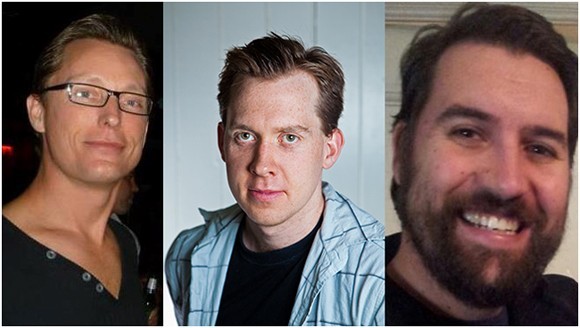
FOR: (L-R) Chris Rhyss Edwards, Matt O’Neill & Stuart Skene.
Chris Rhyss Edwards | 41, Digital Strategy Manager
Marriage is the highest expression of love, and as such, should be available to all who love.
As a straight Christian man I may fall in love and marry, and one day I hope to, yet I cannot reconcile how my love for a woman is in any way different from a man’s love for another man.
To me, love is blind to sexuality and our laws need to reflect this.
It wasn’t always this way. During my time as a soldier I mistakenly believed that homosexual soldiers were different.
Yes, they wore the same uniform and shed the same blood, but I’m a little ashamed to admit that somehow I believed they were different.
I was wrong.
I’ve learned that the courage it takes to serve our nation is the same courage it takes to stand up and openly love a same sex partner.
And if the highest expression of this love is marriage, then the state should not have the right to deny it to an equally significant portion of the population.
Matt O’Neill | 24, Writer
I grew up in a religious household in rural Australia.
I remember being told at eight that homosexuals had no place in the Kingdom of Heaven.
I’ve since come to believe otherwise. What I’d like to say, with genuine love and respect for those who disagree, is that is irrelevant.
Often, people like the idea of forcing religious people to change their beliefs about gay marriage – but their beliefs, and mine, are immaterial.
Should they be otherwise? Perhaps.
Who can say?
For the moment, we live under a legislatively secular government – and marriage is a province of that government.
So, failing marriage suddenly no longer being the province of that government or Australia suddenly becoming a faith-based society, your beliefs, and mine, should continue not to matter.
Stuart Skene | 31, Administration
I believe no one has the right to deny another happiness and equality because of their personal beliefs, especially when those beliefs are not universally held by a majority.
We are currently a country where a majority agree in changing the marriage act while our politicians deny them due to minority groups who, in five states and overall nationally, do not represent the views of a majority of Australians.
I was raised to believe that all people deserve respect and all people should be treated equally.
I was raised by lesbians.
I was taught to celebrate my family, so much so that my first kindergarten show-and-tell was a proud announcement that I had two mums to the shock of my teacher.
The reality of my situation later became clear when my parents insisted on asking other parents if they were comfortable with their kids staying over at the lesbian house for my birthday.
I was lucky, we grew up in an open minded town and every parent was accepting and welcoming and every child was at my sleep over.
If a small town in the late 80s could be so accepting then why in 2013 are we still arguing over the rights of our citizens.
I am sick of them being treated as lesser Australians.
It’s time to do the right thing.
Author: Matt Young
Publication: news.com.au
Publication Date: June 08 2013

